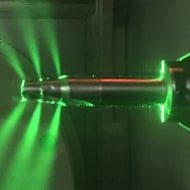Hoffman stew, aka should all #40's "clink" when closing?

Since all of these vents are more than 30 years old, I decided to soak/boil them all in vinegar.
One thing I noticed is that, in operation, not all of them "clinked" when opening or closing. Is that normal? Or should a properly-functioning #40 vent make the characteristic clinking sound?
1950 Bryant boiler in a 1-pipe steam system at 7,000 ft in northern NM, where basements are rare.
Comments
-
Ahhh yes, pickled vents!
I have used citric acid before too for extra-stubborn crud, but it will remove the plating if you boil too long! I have some cool-looking polished brass hoffman 40’s hanging around due to that little incident....
Regarding the *plink!* sound, the 40’s do it quieter than the 1A, and often when that old not at all. I believe the bottom of the float loses its “springiness” and eventually just bulges out slowly rather than popping out suddenly.1 -
"oil canning"
Single pipe 392sqft system with an EG-40 rated for 325sqft and it's silent and balanced at all times.
0 -
They must not be that old. Up until a few years ago they were always silent. In the past four or five years they all clink now but only for about a year and then they go silent. At least mine did but I have all 1A's0
-
Yeah, some of the plating came off of these. Kinda cool-looking...Lard said:I have some cool-looking polished brass hoffman 40’s hanging around due to that little incident....
Regarding the *plink!* sound, the 40’s do it quieter than the 1A, and often when that old not at all. I believe the bottom of the float loses its “springiness” and eventually just bulges out slowly rather than popping out suddenly.
Thanks for the plinking details. Only one of the five make that noise. One doesn't close; it was in the radiator closest to the boiler. The other four work fine.
I bought this house in 1990 and have never bought any vents, until last month. So they are that old.Fred said:They must not be that old. Up until a few years ago they were always silent. In the past four or five years they all clink now but only for about a year and then they go silent. At least mine did but I have all 1A's
1950 Bryant boiler in a 1-pipe steam system at 7,000 ft in northern NM, where basements are rare.
0 -
From my experience yes they click like a tin can. I made the mistake of replacing all of my vents with them years ago to balance the system. Everyone in the building complained about the clicking waking them up at night. I now have mostly gorton's with a few ventrites.
0 -
Single pipe 392sqft system with an EG-40 rated for 325sqft and it's silent and balanced at all times.
0 -
2-3 weeks ago I remember seeing a youtube of someone showing cutaways of several different brands/models of radiator vents. IIRC, it was showing the internal differences between models based on a bimetallic strip vs encases alcohol mechanisms. I just looked for it again but can't find it. Does anyone happen to have the link to it?
EDIT: never mind, I just found it. It is one of @Gordo 's excellent vids: https://www.youtube.com/watch?v=0ugIrg9bquk
https://www.youtube.com/watch?v=0ugIrg9bquk 1950 Bryant boiler in a 1-pipe steam system at 7,000 ft in northern NM, where basements are rare.
0
Categories
- All Categories
- 87.3K THE MAIN WALL
- 3.2K A-C, Heat Pumps & Refrigeration
- 61 Biomass
- 429 Carbon Monoxide Awareness
- 120 Chimneys & Flues
- 2.1K Domestic Hot Water
- 5.8K Gas Heating
- 114 Geothermal
- 166 Indoor-Air Quality
- 3.7K Oil Heating
- 77 Pipe Deterioration
- 1K Plumbing
- 6.5K Radiant Heating
- 395 Solar
- 15.7K Strictly Steam
- 3.4K Thermostats and Controls
- 56 Water Quality
- 51 Industry Classes
- 50 Job Opportunities
- 18 Recall Announcements

